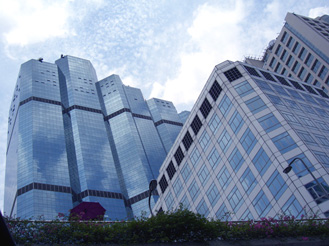Thailand facts, realities and trends as of end of year 2006.
Here are various interesting bits of general information around Thailand's economy, stock market and other facts often under-reported, as seen from this desk on December 12 '06. 
1) On average this year, and over the past many years before, some 2/3 of all stock market investing on the Thai SET, is transacted by foreigners to Thailand. This foreign investing is dominated by institutional investors from all around the world. The Thai people themselves make up for the balance 1/3, but most of them sadly so just day-trade the Thai market and so miss out on responsible long term value investing. Day-trading is just another way of speculating -and has nothing to do with investing.
While some argue the day traders provide liquidity, the reality is that the day traders usually focus on a few speculative stocks and so liquidity is concentrated only on those.
2) The Thai economy grew only about 4.6% this year, this is below its long term recent average over 5%. The reasons for this was rising oil prices (now tamed), higher interest rates -and political uncertainty. All three of these "villains" have been getting better. We expect interest rates to drop next year and global oil prices keep stable, especially in Baht currency. The Thai Baht is currently the strongest currency in Asia, rising some 14% vs. the US Dollar, this year. However vs. the Swiss Frank and EU, the Thai Baht currency has not moved up much in year 2006. (less then 3-4%). Thai elections will be held by next October 2007, but I expect the SET index to be higher by then.
3) I would estimate the average annual growth rate of the Thai economy was at least 5%, since year 2000. And next year 2007, I expect this growth rate to climb above this average rate, or say around 5.5%. To put this in contrast, this is double the growth of the US economy. Thailand depends less on the US economy now, as interregional trade in Asia has grown considerably in the past few years -and besides, Japan, India and China are all advancing at a considerably pace. (So are the Mid East Gulf economies, which increasingly shy away from USA). This so is now more important then the influence of the EU or USA economies, on the Thai economy.
4) While Thai smaller cap stock investing has produced superior results for many years, it must remembered that most of these companies are nevertheless (rather often) clear leaders in what they do/or produce. Some are in fact leading firms in the world, in what their respective industries, and yet are still considered "smaller cap stocks", on the SET. Investing by foreign institutions must remain focused on larger cap companies, which almost always have high p/e valuations and lower dividends -then the faster growing smaller cap companies.
5) Investing in Thai stocks directly does not present foreign ownership problems or restrictions. Foreign investors have all the same rights as Thai people do, i.e to dividends and rights offerings etc..(Only the legal right to vote at the company's annual meeting can have restrictions. And then only if a foreigner does not own the Foreign shares). This so is a big advantage as compared to direct investing in Thailand where landownership is restricted and company investing through nominee shareholder structures carries restrictions and has recently come under scrutiny.
6) The Thai SET benchmark index is hugely un-representative to the individual investor, regarding the progress of actual investment results here. This is because this SET index is weighted by market capitalization and so the bigger a company, the more weight is given in the SET index. And since larger cap stocks have underperformed for many years, this index shows much lower returns then the reality! Thai stocks remain one of the least valued in Asia and I for one believe 2007 will the year where the SET will move-out and above its long 640 to 790 trading range, where it has been stuck for nearly 4 years! If that happens many smaller cap value stocks will double and then some in value, this I firmly believe.
Lower oil prices and better politics, along with dropping local interest rates will be the key drivers to this, along with improving corporate profitability. Finding, analyzing and then visiting these smaller Thai companies regularly in person is our strength here -and key reason to a long history of superior performance returns. Our web site Thaistocks.com then assures others will in time discover and read our objective & unbiased analysis -and so then these under researched & followed companies will be considered by an ever large investor audience from around the world.
Here are various bits of statistics you may consider of interest *: ---The total Thai population for year 2006 is now estimated at 66 million people, this is up from 61 million 5 years ago and 57.8 million in year 1992. It is projected to reach 70 million, by year 2016. ---The Median Thai Age is 30.5 and the life expectancy at birth is 71.4 years. The percentage of people over age 60 has risen from 9.4% to 10.5% of the population, in the past 5 years. ---The GDP per capita income has risen from 86,467 Baht in year 2002 to 144,500 Baht this year. ---The Thai Baht currency has appreciated from 42.5 to 35.5 vs. the US$, or 16.5% from the beginning of year 2002 to currently. ---The minimum daily wage rate in and around Bangkok has risen from 169 Baht per day in January 2003 to 184 currently, or by 8.85% over 3 years. (1 SFR =29.7 Baht or 1$ = 35.6 Baht) Dec 12 '06.
Best Regards,
Paul A. Renaud.
*Source of this is www.alpharesearch.co.th
and Thailand Board of Investment(BOI) See. http://www.boi.go.th/english/how/demographic.asp

